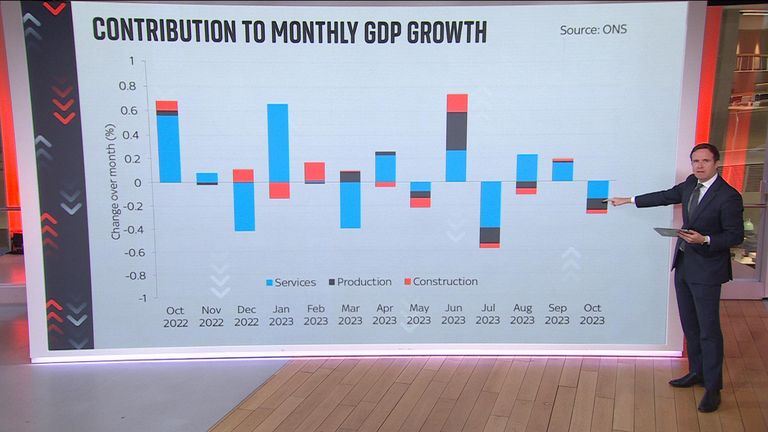UK economy at risk of recession, official figures reveal


The UK economy has performed worse than previously thought and below the expectations of economists, new official figures show, meaning the country has taken the first step towards recession.
There’s been a downward revision to GDP, a key measure of economic growth, the Office for National Statistics (ONS) said on Friday morning.
Rather than remaining stagnant, as first thought, the economy contracted 0.1% in the three months from July to September.
Economists had been expecting growth of 0.2%.
A country is technically in recession after two three-month periods of a shrinking economy.
If the final data for the fourth quarter of 2023, from October to December – which will be released next year – shows a contraction, the country will officially be in recession.
Another amendment was made to the second quarter of this year, from April to June. Rather than growing 0.2%, as was previously announced, the ONS has said there was actually no growth.
Changes were made to the statistics as regular monthly business surveys and VAT returns showed less spending, said the ONS director of economic statistics, Darren Morgan.
Weaker performances from smaller businesses, particularly hospitality and information technology (IT), influenced the adjustments, Mr Morgan said.
Advertisement
In the most recent quarter, film production, engineering and design, and telecommunication all faired “a little worse” than expected.
VAT data takes time to receive and process, he added.
Please use Chrome browser for a more accessible video player
2:16
UK economy goes into reverse
In the latest three-month period there was a 0.2% fall in the large services sector, offsetting a 0.4% expansion in construction output and a 0.1% boost in the production sector.
It amounted to the biggest downturn in consumer-facing services since September 2021 when a COVID lockdown was imposed.
Read more:
Rishi Sunak set to struggle to meet key pledge
UK car makers welcome tariff-free exports extension
Responding to the figures, Chancellor Jeremy Hunt said: “The medium-term outlook for the UK economy is far more optimistic than these numbers suggest.”
“We’ve seen inflation fall again this week, and the OBR [Office for Budget Responsibility] expects the measures in the Autumn Statement, including the largest business tax cut in modern British history and tax cuts for 29 million working people, will deliver the largest boost to potential growth on record.”
Data also published on Friday morning recorded a far above expectations 1.3% increase in retail sales volumes for November after a possible Black Friday boost. Expectations were for a 0.4% growth.
Retail sales figures are important as household consumption is the largest expenditure across the UK economy.